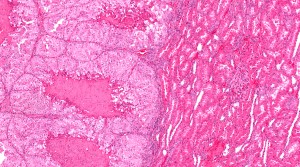Novel method may lead to earlier detection of renal cell carcinoma
Huntsville, Ala. — Researchers at the HudsonAlpha Institute for Biotechnology have discovered new “biomarkers” that are very strong predictors of renal cell carcinoma, the most common type of kidney cancer in adults. These markers are a set of about 20 positions in the human genome that show striking differences in an epigenetic change called DNA methylation in kidney tumors compared to non-tumor kidney tissues from the same individuals.
The research was conducted in the lab of HudsonAlpha president Richard M. Myers, Ph.D., along with faculty investigator Devin Absher, Ph.D., Stanford urologist James Brooks, M.D., Ph.D., and HudsonAlpha postdoctoral fellow Brittany Lasseigne, Ph.D.
“We have discovered and validated a DNA methylation biomarker panel that is capable of differentiating kidney tumor from benign adjacent kidney tissue, irrespective of tumor histology and with high sensitivity and specificity across all tumor stages,” said Myers. “These biomarkers could potentially aid in early clinical detection of kidney cancer, distinguishing between benign and malignant lesions, and monitoring patients after therapy.”
Renal cell carcinoma is the tenth most diagnosed cancer in the U.S. Most patients with early stage renal tumors do not have symptoms, and the cancer is often discovered only late in the disease, after it has spread to other tissues and is much harder or impossible to treat. Thus, there is a strong need for biomarkers that can detect the presence of cancer early in the disease, prior to symptoms, and also to monitor patients during and after therapy.
The results of the study are discussed in the paper “DNA methylation profiling reveals novel diagnostic biomarkers in renal cell carcinoma,” published this month in the online medical journal BMC Medicine.
The research team examined tissues from tumors and adjacent normal tissues from 96 kidney cancer patients under Dr. Brooks’s care at Stanford. Using several computational and statistical methods, it looked for DNA methylation changes in the cancerous tissues compared to the normal tissues.
This study is different from previous work in Myers lab because the team was able to look at a large number of DNA methylation sites at once and then combine them into one model.
“In our data, the model was 99 percent accurate in determining tumor from normal, and we were able to validate that in more than 1,000 tissues from a publicly-available data set from The Cancer Genome Atlas,” said Dr. Lasseigne.
“Most people don’t find out they have kidney cancer until its already progressed, so we want to be able to develop an easy assay to test a patient’s urine or blood that could serve as a screening test for the general population over a certain age, or people who are at risk for kidney cancer,” added Myers. This would allow this type of cancer to be detected early, which would greatly increase the chances for effective treatment or even a complete cure. In addition, a blood or urine test would allow monitoring of the progress of patients following treatment.
This project was funded by an award from The Daniel Foundation, by the HudsonAlpha Institute for Biotechnology, and by the NIH Early Detection Research Network.



